Ade Bantu is the front man of the musical collective known as Bantu (also known as Brotherhood Alliance Navigating Towards Unity). His music is an eclectic fusion of the rich cultural heritage of the Yorubas and the sounds of the African Diaspora.
His debut album “Bantu” featured Senegalese Hip-hop veterans P.B.S; and his collaboration with the Nigerian Fuji star Adewale Ayuba titled “Fuji Satisfaction”, earned him two nods at the 2005 edition of the prestigious Kora Award. Bantu’s positive lyrics address social, personal and political issues and his work with the Afro-German NGO and musical group, Brothers Keepers, topped the German Pop Charts through their uncompromising stance against racism. Bantu now performs with his Afrobeat Academy Band, an ensemble that celebrates Fela Kuti’s musical vision in a unique and exciting way. Their live performances have been described as a soundtrack to the Pan African Renaissance Movement.
Bantu, a BSc Electronic Engineering holder, has toured Nigeria, Sweden, England, Germany, Uganda, Ghana, Denmark and France. He has shared the stage with several musical greats such as Tony Allen, Dede Mabiaku, Seun Kuti and the legendary Egypt 80 band; and has collaborated with UB40, Gentleman, Xavier Naidoo, Sly Dunbar and Patrice. I had the chance to have the following interview with Ade Bantu.
How would you describe Bantu as an artiste?
Bantu is a grenzgaenger. He is a pan Africanist. I am an “Afropean”, Yoruba-Prussian musician, producer, singer/songwriter and activist, who uses music to explore and celebrate his urban African musical and cultural heritage.
When did you discover your talent as a musician?
I have always liked music. I grew up with my dad DJ-ing every Sunday while the family did “general cleaning”. When I came to Europe to further my studies my course mates invited me to join their rap band, and from there on there was no looking back
Who are your musical influences?
My musical influences are very diverse. I grew up on James Last, Fela, Peter Tosh, Beethoven, Beatles, E.T. Mensah, Stevie Wonder, Public Enemy, Millie Jackson, Soul, Funk, Highlife, Afrobeat, Afrofunk, Juju,- basically good music.
When did you start performing?
I started performing about 15 Years ago
When was your lucky break, your defining moment as a musician?
My lucky break was in 1999 when I scored a radio hit in Nigeria with Bantu the song was titled “Nzogbu“. From there on we grew from song to song. We also scored a top ten hit in Germany with a musical project called Brothers Keepers in 2001. In 2004, we recorded with UB40, and in 2005 we received the Kora Award for Best Group Africa and West Africa. There are many defining moments.
How do you describe your kind of music?
It’s an eclectic mix of Afrobeat, Afrofunk, Hip-hop, Dancehall and Fuji music. I call it “The Sound of Fufu”
Why do you choose to perform that kind of music?
The music, my philosophy, my art reflects who I am. My mum is German and my dad is Nigerian. I am a “NiGerman”. I grew up in both countries and continents.
What do you normally sing about?
I sing about the realities of my surroundings. I celebrate Africanism, love, dreams and hopes of my people. I try to amplify the pain and suffering of the marginalized.
How are people responding to that message?
The feedback is good. I think basically it has to do with me being honest. I am constantly learning. I am an apprentice of life in search of the truth, always questioning authority and the norm. I am not scared to show my vulnerability and weaknesses. After all I am not perfect. A lot of people can relate to this.
As a pan-Africanist, do you think pan-Africanism can truly help Africa?
I think Pan Africanism is the only solution for Africa. We must unite. It is simple mathematics. We need to know more about one another, rediscover our common philosophical, cultural and political heritage. That’s the only way we can survive in a globalized world. Africa needs to protect her interests, speak out as one voice. Kwame Nkrumah had a vision, we need to study it, revise his Pan African ideas and learn from past mistakes.
Do you think there can ever be a United States of Africa?
There is no alternative; we need a United States of Africa. We are too weak as singular states, too vulnerable to exploitation. Unfortunately our leaders are all myopic. We don’t have visionaries. It’s still the old generation of thieves and power hungry “militicians” who are at the helm of affairs.
Have you been able to cross borders with your music?
Yes I believe very much so. I have been able to sensitize Germans about racism through my music and NGO work with the Afro-German musical collective, Brothers Keepers. I speak out for Africa and Africans in Europe. I have not forgotten home–my band, Afrobeat Academy, and I have toured Ghana, Nigeria, and Uganda giving concerts and empowering young creative minds through musical workshops.
You have a new single, “No More No Vernacular”. What is that song about?
“No More No Vernacular” is about the experience we all go through as children in school; where you are told that you should not speak your indigenous language. You must only speak “Queens” or “Oxford English”. I got flogged a lot of times for speaking Yoruba or Pidgin English with my school mates. Some teachers couldn’t understand why I was so keen on speaking what they called “bush language”. I think it shows how the colonial mentality amongst us Africans creates an inferiority complex. And we wonder why we are not progressing. We have internalized the projections of racist Europe. It is a shame.
Do you write your own songs?
Yes I do. Sometimes I write with my brother Don Abi when he comes in as a guest artist.
What inspires you to write your songs?
I get inspired by conversations, TV, radio, books, magazines, Wikipedia, a baby’s cry, Paintings, a kiss, anything that triggers my imagination.
What is your opinion on contemporary African music?
There is so much good music being produced and performed by Africans both at home and in the Diaspora. The problem is that the Anglophone listeners don’t get exposed to the incredible music from Francophone Africa and vice versa, I’m not talking about Congo or Ivory Coast music. There is a divide that needs to be addressed. Senegal, Mali, Burkina Faso have very cutting edge artists and producers that are making waves and are recognized world wide. Talk less of Lusophone Africa. We need to be more adventurous when looking for African music. We have 53 countries that need to be discovered.
Do you think that our young crop of musicians have the kind of music that can put Africa on the world map, say win a Grammy?
I think a lot of young African musicians are wanna-be 50 Cents, Ushers or R. Kelly’s. Most of them have not researched their musical Heritage. Ghanaian and Nigerian Hiplife or Rap artists don’t know about the Ebo Taylor’s, E.T. Mensah’s, Orlando Julius and many more great musicians and bands. You can’t be more catholic than the Pope. So how do you want to better than Americans in what they invented? We can only offer the world something if we know who we are as urban Africans. We must do our homework; know our roots and then go on to create something that represents Africa 2007/08
What have been the highlights of your music career?
Winning the Kora Award 2005; The African Festival Award 2007; working and recording with UB40, Gentleman, Adewale Ayuba; travelling with the German Minister of External Affairs, Frank Walter Steinmeier on his First trip to Africa in August 2007 as part of his cultural delegation; and performing for Desmond Tutu.
What do you hope to achieve in the future with your music?
I want to keep on pushing the envelope challenging myself and incorporating many more sounds and styles to my music. I want to work with various talented producers and musicians from across the globe and Africa in particular
What should music lovers expect from you in the near future?
My forthcoming album is titled “Lovelite Sessions”. It was recorded live at the Lovelite Club, Berlin. It features all my live material performed by me and my 14-piece band, Afrobeat Academy Band. It will be released in March 2008.

Ameyaw Meets
Oprah Winfrey & Blitz Bazawule answer my questions about ‘The Color Purple’
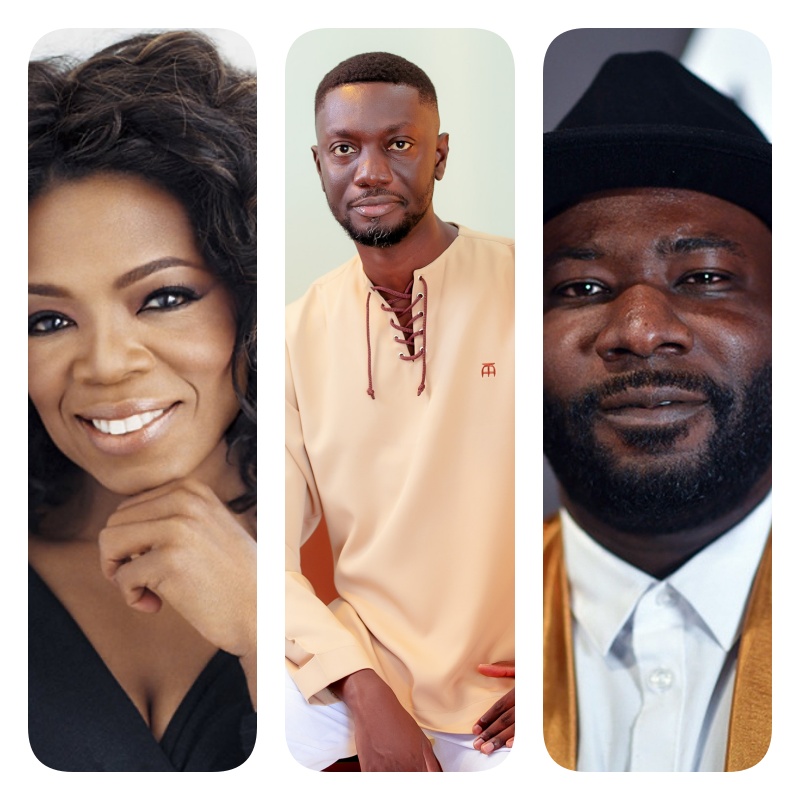
In April, I had the opportunity to join a Zoom Q&A session with Oprah Winfrey and Blitz Bazawule, courtesy FilmOne Distribution. The conversation was around the bold remake of ‘The Color Purple’ scheduled for release this Christmas! (more…)
Ameyaw Meets
Asari Music highlights new single ‘Like Dat’, balancing college with music and more
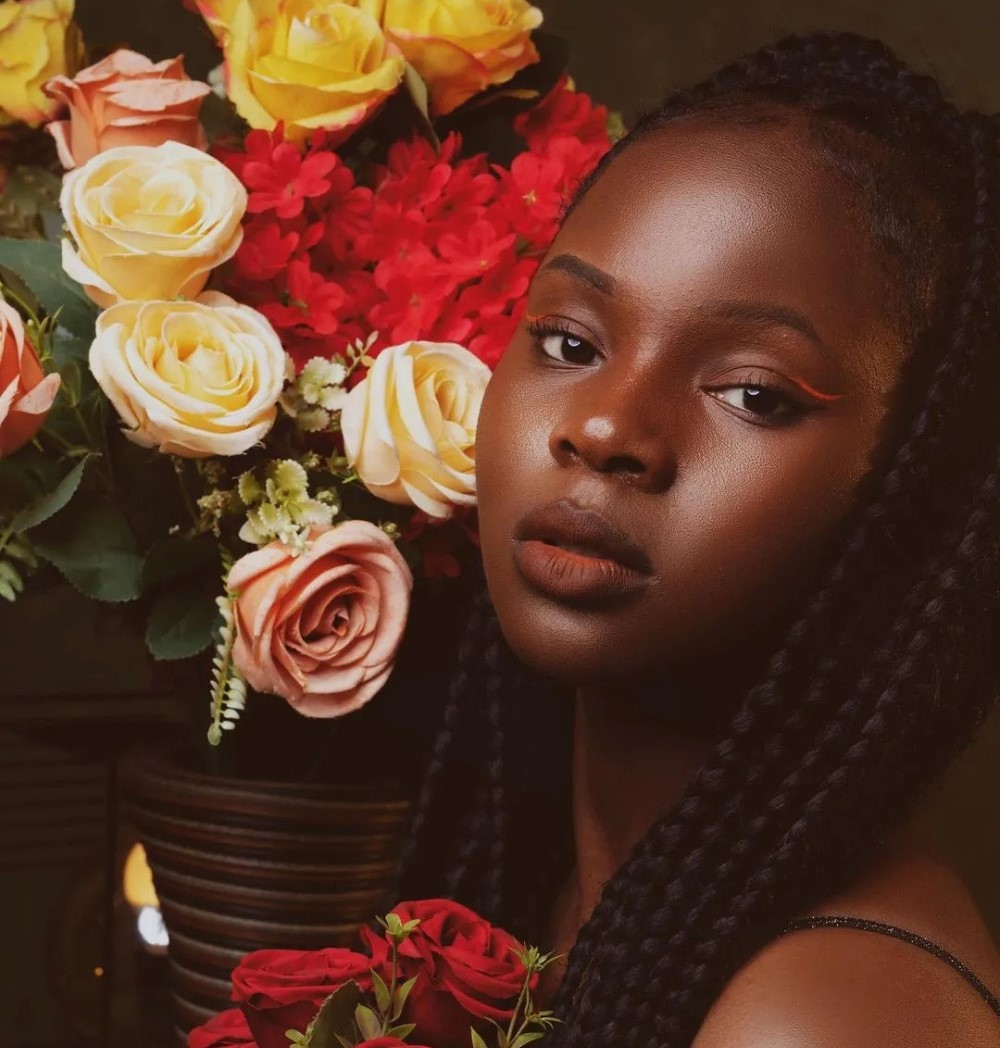
Week-in week-out I get to interview one of the many faces in showbiz and this week on Ameyaw Meets, Asari Music is the one. She’s a young, upcoming and very talented Ghanaian-American singer – who in case you haven’t heard, is out with the hottest song you might hear all week. (more…)
Ameyaw Meets
I single-handedly popularized Shea Butter in the United States – Margaret Andega
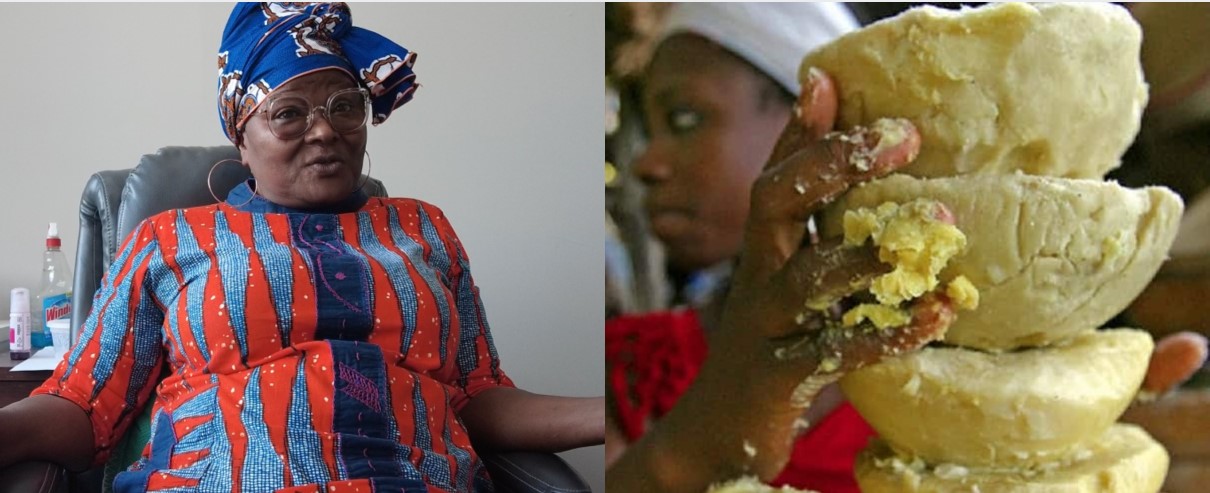
According to Margaret Andega, a Kenyan entrepreneur in Atlanta, she was the driving force behind the commercialization of Shea Butter in the US during the late 90s. (more…)
Ameyaw Meets
He went from cooking on Instagram to owning a food truck in Atlanta and more… the story of Quabena’s Kitchen
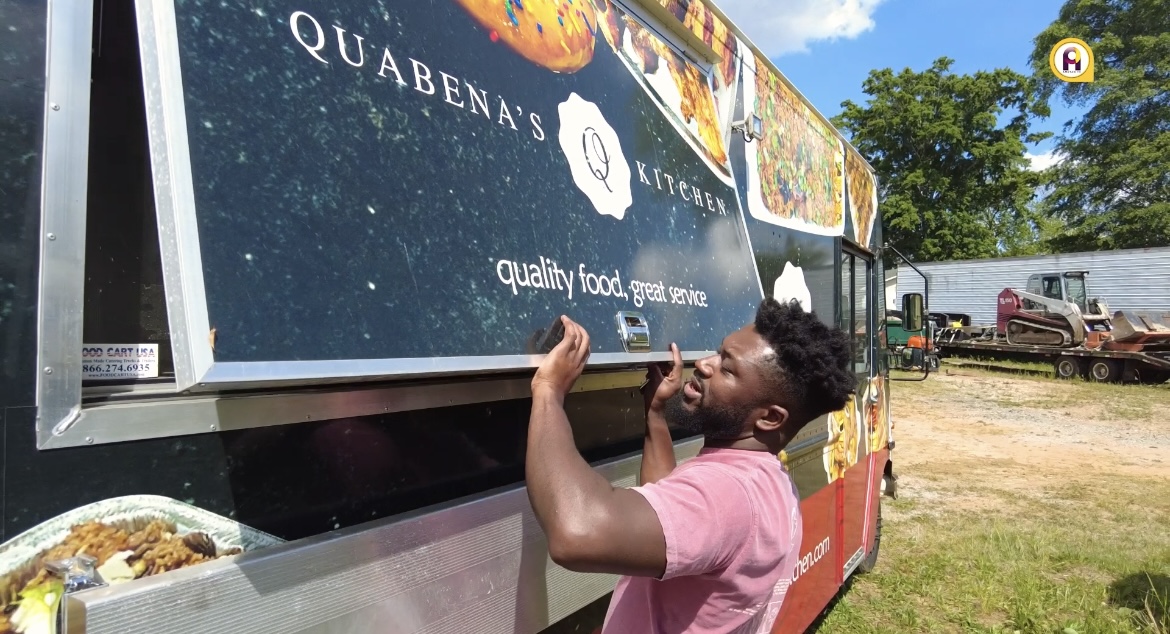
The COVID-19 pandemic birthed many opportunities for people all over the globe. For one Ghanaian living in the US, the pandemic reconnected him with his passion which has now become a full-time job.
Quabena’s Kitchen shared with me his story about how he went from cooking for family and friends, to sharing content of his cooking on Instagram page at the height of the pandemic, which has now transformed into a thriving catering business in Atlanta, Georgia.
Quabena’s Kitchen services now include a food truck providing Ghanaian and West African delicacies to Africans and non-Africans alike, with ambitions of a restaurant on the cards!
Watch this exciting story on Ameyaw TV below:
Read Also: The chef behind Fufu Pizza is about to open Afro-Fusion Cafe in Atlanta
Ameyaw Meets
The chef behind Fufu Pizza is about to open Afro-Fusion Cafe in Atlanta
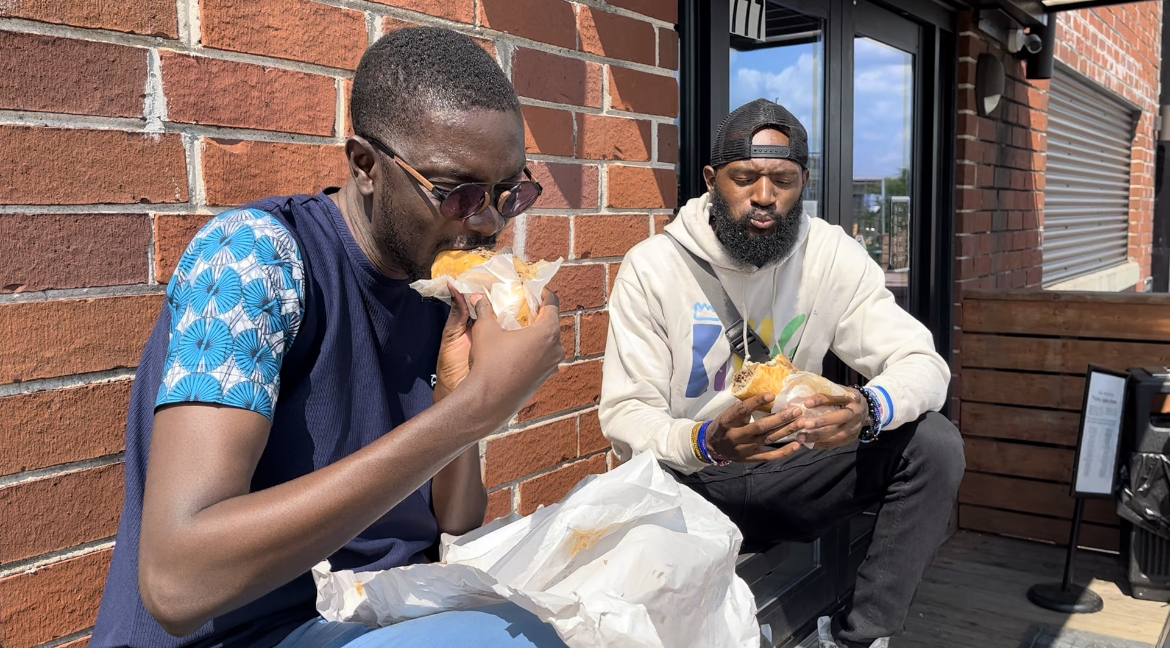
US-based Liberian professional chef, Chauncy Yarngo caught the attention of the world with his amazing creations such as fufu pizza, fufu taco, plantain burgers and more. (more…)
Ameyaw Meets
Why Ghanaian-American Jeffrey Ampratwum is the menswear expert to watch in fashion!
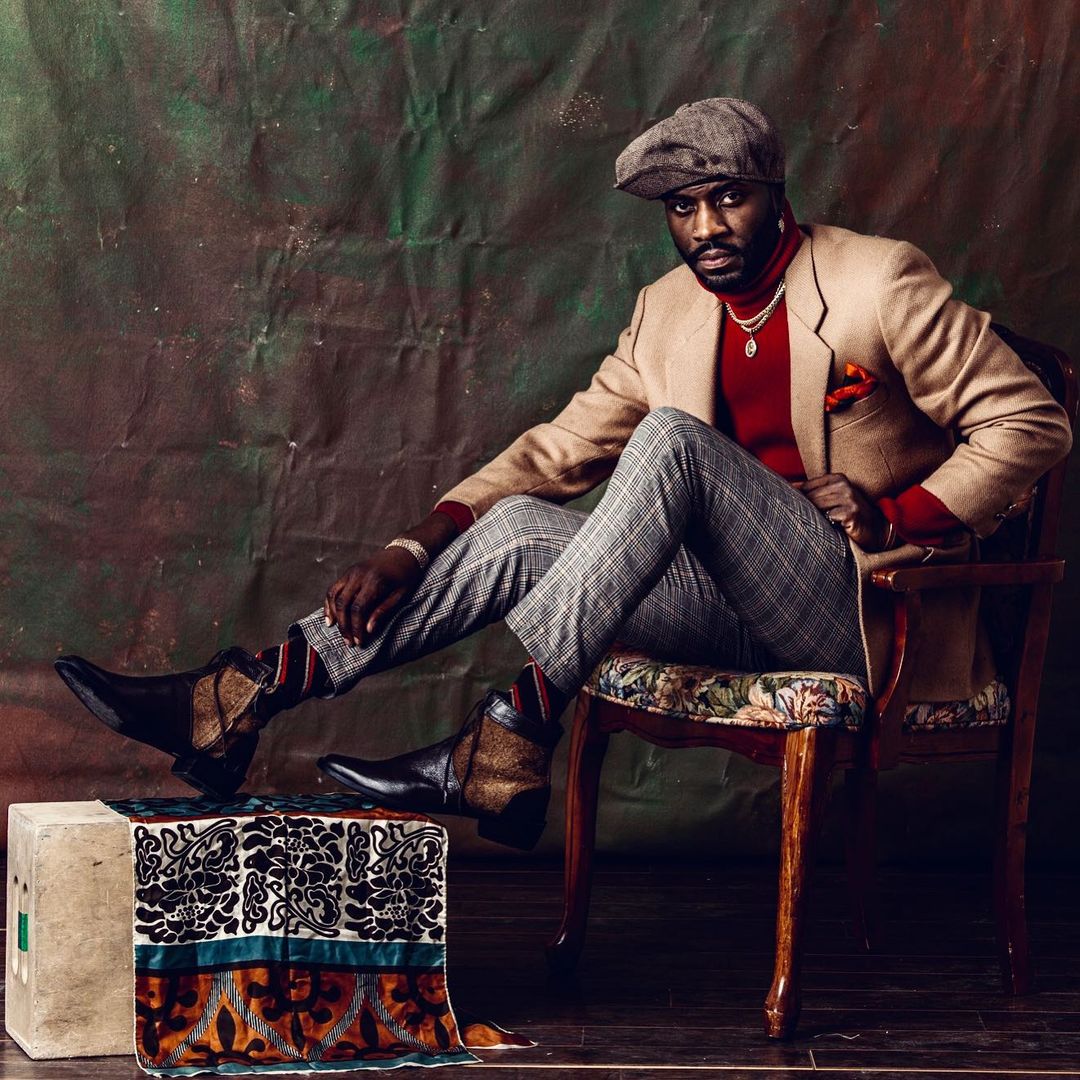
At the start of the Victoria era, early 19th century – the English began to tone down the royal style dressing of the French army, namely those adorned in prestigious regalia and heavy embroidery. It was a sign of English nationalism and sparked a new wave of appearance in men. A few decades later, the suit was born and heavily influenced those in Italy and America. The British and the Americans have a rich revolutionary history, of course, and coincidentally the British colonized the African country – Gold Coast – until 1957 when they declared their independence and changed their name to Ghana.
As part of an independent Ghana, a host of individuals began to exercise new freedoms and venture out of the country into new territories. Many Ghanaians set their eyes on American travel and a wave of trail blazers left the country and settled in the infamous New York City. For most, it was an opportunity to plant new seeds in the hopes that their children would be afforded even more opportunities for a prosperous life.
One of these children of the diaspora is Bronx-born Jeffrey Ampratwum. The only child to Kate Bampoe and Eugene Asante-Ampratwum Mpere, who met in the Bronx after immigrating from Ghana. The dynamics of having African parents and being raised in a heavily eclectic environment gave rise to Jeffrey’s style and prose. More importantly, we can honestly say that there are only a handful of Ghanaian-Americans living in the states that can exhibit a special presentation that reflects both their African heritage married with the esthetic of their nationality. We recently caught up with Jeffrey to discuss how his early influences provided him with a framework to now become such a strong force in the menswear industry in fashion.

AD: Jeffrey, Ɛte sɛn?
Jeff: Haha, Eye.
AD: I had to test your Twi really quick! You know most Ghanaians who are born in the states don’t have a clue about the language unless it’s spoken fiercely in the home.
Jeff: You are 100% correct with that. Ha. But for me, I was lucky in that my mother took me to Ghana before I even knew how to use words. So, in actuality, Twi was the first language and vocabulary I learned, and in essence, English is my second language. So, I’m really decent when it comes to using Twi. I’m a cheat code! But keep that quiet. Ha.
AD: How much of the remnants of the Ghanaian culture factored into your approach to your style and presentation?
Jeff: When I was younger and in school, particularly in the Bronx – it wasn’t always your proudest moment to be from Africa or to say your family was African. Part of the silly embarrassment was perhaps from the narratives that were spinning on television. Americans were being indoctrinated with visuals of “feed the children” which only highlighted the extreme poverty in a few Africans countries. The images and broadcasts were all the same, for decades. So called philanthropist and humanitarians took camera crews into ravaged areas and televised starving children for us to see here in the states. I believe that had a profound effect on young boys and girls born from African parents.

However, as for me – I always looked at being dark skinned and being deeply rooted into my African culture as a super power. I liked the idea of being different, even though all the kids in all my classes were also children of immigrants. They just couldn’t grasp the concept of it at that time. So, from there, it was showtime. My Uncle, Joseph Ken Mintah – was the pioneer as the first in the family to travel to the states – he had extreme style. My mother also is very detailed with her sense of jewelry and fragrances. I adsorbed it all.
AD: Did you start dressing in traditional African attire? What do you mean exactly?
Jeff: Not exactly! But, being an only child really allowed for me to sit deep in thought for long periods of time. Being left-handed allowed for me to be extremely dexterous and detailed. And being raised solely by my mother further allowed me to pay attention to the importance of clothing and accessories – as she dressed herself each morning. It was the ultimate cocktail and I was already drunk with creativity. I started customizing all the clothes I had. By no means were we wealthy, so I had to manage just a few outfits for school.
My styling began when I would turn 5 outfits into 15 – so essentially, a 5-day school week became New York Fashion Week for me. I would airbrush my sneakers, turn Old Navy sweaters inside out for a fleece appeal, and cuff my jeans in 4 different ways depending on my footwear. This soon became a bad habit and made me late for school many mornings.
AD: You see, if you are late to school in Ghana back then – you might as well have sat by the road to hide from both your mother and headmaster! What was college like for you then?
Jeff: Right! Ha. It grew legs during my undergrad. Now all the pretty girls were around, I had more freedom to come and go, and more importantly – I had a stage to showcase my style. I joined a student club in the SEEK Program, and soon became the President and started hosting a string of events based around fashion. 4 years and a bachelors degree later, there were 6 fashion shows and 3 beauty pageants under my belt. Huge successes. I started to doubt my real educational reason for attending college, which was to become a dentist. Fashion was dancing on one shoulder and dentistry on the other. But somehow, I figured out how to still involve the two. My best buddy, Kenny – whom I met at the college on the road to become dentists – made it through. So, I live vicariously through him. And now, coincidentally – together we’ve developed a brand – a service of bespoke mens luxury shoes and women’s handbags, and ready to wear womenswear shoes as well. Named, Kenjeffreys. It is serendipitous because all of the products are sourced and handcrafted in Haiti and infused with Ghanaian culture. As Kenny is from Haiti, we properly employ artisans within the community and focus heavily on our social impact.
Following undergrad, I then began at FIT as student, really just trying to test my styling hand – and to learn more about the industry. While there, I came across extremely talented and knowledgeable fashion professionals that have really guided me. Namely, Sadia Seymour and Joseph DeAcetis. Both wildly experienced, patient and embedded with a wealth of information. Respectfully in womenswear and menswear. You cannot beat that, and I am grateful for it.
AD: That is strangely unique and admirable. Talk to us about how all those experiences and inspirations give rise to the Jeffrey or Che we see today and ultimately, where that places you in your field of fashion and menswear.
Jeff: Sure. Great point. I have been indoctrinated by the basic principles of creativity as an adolescent – with respect to clothing. That is extremely hard to shake. Innately, styling was my ultimate form of communication, seeing that I was a shy introvert. So now, I still revert back to those same feelings…. the feeling of home, warmth, memories, great food and innocent fun. My approach now is exactly the same in the sense that when I am dressing, styling or designing for someone – I am taking into account their entire repertoire and holding a mirror in front of them which reflects the items that they love most. It is a skill that perhaps only empaths are only able to exhibit.
Having the ability to read into thoughts and connecting with the motivating spirits that drives people – is a gift. I ran the New York City marathon three times, and the 2nd time I ran it in a tuxedo! It was my ultimate homage and pledging of allegiance to fashion. Ha.

I also believe my extensive traveling experience has aided to the arsenal. Recent trips to Ghana always resets a creative instinct with me, as I look around and arrive back to a place of self-awareness. It feels right. My cousin Harry knows where to be to capture the real essence of the land. And, coincidentally enough, I am often back and forth to the UK as well. Savile row in London, England -as you know – is a menswear connoisseur’s Disney Land. It is the traditional hub for the world’s best tailored-bespoke suits. Naples and Florence are a close second. However, sartorially, the British have etched their names in the fine-art making of the suit. I do though spend most of my time in Brighton, UK. It’s where my love is and also like a second home for me. The culture there is infused with various styles and the community is inviting. The Duchess of Brighton-Hove, Lady Donna and her amazing friends will assure that you have a great time!
AB: Finally, talk to us about your styling approach with respect to specific talent that you work with.
Jeff: Definitely. This is perhaps an area you cannot teach. It is learned with years of experience and even reading the room wrong most times. I tell my fashion students often that they have to continue shooting airballs at the basket. Get out the miss shots, now – and properly learn your subjects. For example, if I am styling a celebrity for the red carpet – several nuances are to be considered before arriving at a dress or a tuxedo. Such as, what stages in life is your talent currently in, how body conscious are they and what are they most nostalgic about. These (and some of my other secrets that I cannot give away) are the pillars to nailing great style, image and presentation.

-

 Gossip13 hours ago
Gossip13 hours agoHajia4real gets one year one day in Prison
-

 World News2 days ago
World News2 days ago‘Night at the Museum’ actor Bill Cobbs dies aged 90
-

 Buzz3 days ago
Buzz3 days agoEsther Smith announces return to Ghana for first concert in over 10 years
-

 Buzz19 hours ago
Buzz19 hours agoLilWin teases new song from hospital bed reflecting on tragic accident
-

 Buzz2 days ago
Buzz2 days agoBullet and I are back to working together – Wendy Shay
-

 People & Lifestyle2 days ago
People & Lifestyle2 days agoDJ Liam and ‘Britain’s Got Talent’ star Abigail perform on Joy Prime’s 4KidzParadise
-

 Buzz3 days ago
Buzz3 days agoYou’ve done the honourable thing — Stonebwoy to Davido
-

 People & Lifestyle3 days ago
People & Lifestyle3 days agoCEO of Baron Autos throws grand sallah party in Tamale, announces new branch
-

 Buzz2 days ago
Buzz2 days agoZonda Tec Ghana introduces Tank 300 and POER pickup models in Ghana.
-

 Buzz3 days ago
Buzz3 days agoEfia Odo Condemns ‘Kiki’ Challenge, Calls it Disrespectful to Christianity
-

 People & Lifestyle2 days ago
People & Lifestyle2 days agoMTN GHANA ANNOUNCES NATIONWIDE NETWORK UPGRADE TO IMPROVE CUSTOMER EXPERIENCE AND REDUCE ITS CARBON FOOTPRINTS
-

 Photos1 day ago
Photos1 day agoPhotos: Popular Nollywood actress Sharon Ooja ties the knot
